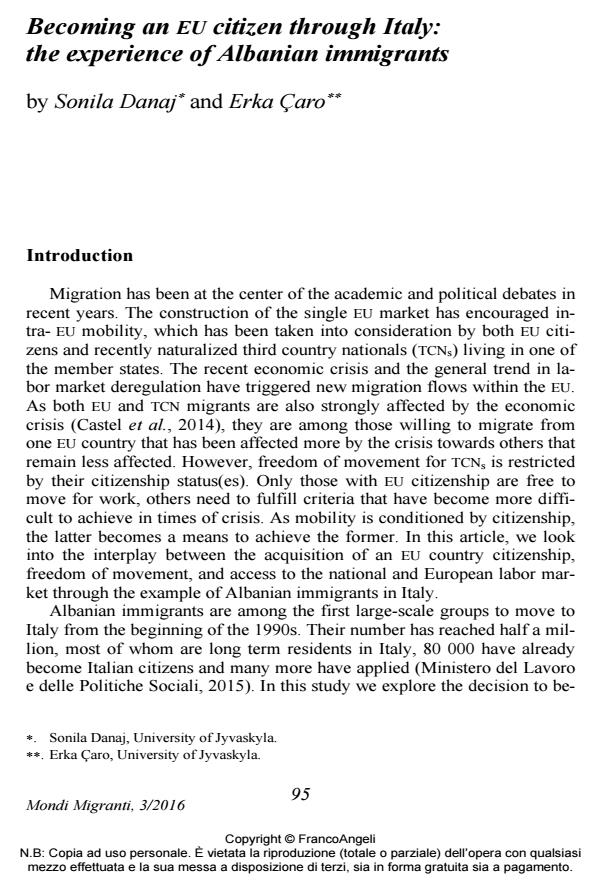Becoming an EU citizen through Italy: the experience of Albanian immigrants
Titolo Rivista MONDI MIGRANTI
Autori/Curatori Sonila Danaj, Erka Çaro
Anno di pubblicazione 2017 Fascicolo 2016/3
Lingua Inglese Numero pagine 14 P. 95-108 Dimensione file 182 KB
DOI 10.3280/MM2016-003007
Il DOI è il codice a barre della proprietà intellettuale: per saperne di più
clicca qui
Qui sotto puoi vedere in anteprima la prima pagina di questo articolo.
Se questo articolo ti interessa, lo puoi acquistare (e scaricare in formato pdf) seguendo le facili indicazioni per acquistare il download credit. Acquista Download Credits per scaricare questo Articolo in formato PDF

FrancoAngeli è membro della Publishers International Linking Association, Inc (PILA), associazione indipendente e non profit per facilitare (attraverso i servizi tecnologici implementati da CrossRef.org) l’accesso degli studiosi ai contenuti digitali nelle pubblicazioni professionali e scientifiche.
The article explores the experience of becoming Italian citizens and by extension European Union (EU) citizens among Albanian migrants in Italy. It analyzes Albanian migrants’ reasons for applying for citizenship, how it affects their status, access to social rights, labor market, and identity. It also focuses on the effects of an EU member state citizenship in the lives, work trajectories, and future prospects for further mobility of these migrants. The empirical data indicate that Albanian migrants have been oriented towards naturalization through which they experience empowerment and agency, and feel more secure to navigate the Italian labor market and society. The awareness of the EU citizenship, among Albanian migrants, as a derivative of the Italian one has increased during the naturalization process mainly as the result of the impact of the economic crisis on the Italian labor market and their position as workers. Italian citizenship, thus, becomes a strategy for further integration and, in case of necessity, of further mobility.
L’articolo esplora l’esperienza dell’acquisizione della cittadinanza italiana e, per estensione, della cittadinanza europea tra i migranti albanesi in Italia. In particolare, il contributo indaga le motivazioni che hanno spinto i migranti albanesi a richiedere la cittadinanza e le ripercussioni di tale scelta sul loro status, sull’accesso ai diritti sociali e al mercato del lavoro, nonché sulla loro identità. Inoltre, l’analisi si focalizza sugli effetti dell’ acquisizione della cittadinanza EU nelle vite, traiettorie lavorative e prospettive nella mobilità dei migranti. I dati empirici indicano che i migranti albanesi che hanno acquisito la cittadinanza italiana hanno vissuto un’esperienza di empowerment e di agency, che ha reso la loro presenza nel mercato del lavoro e nella società italiana più sicura. La consapevolezza tra i migranti albanesi dell’acquisizione della cittadinanza europea come derivato della cittadinanza italiana è aumentata durante il processo di naturalizzazione, principalmente per effetto dell’impatto della crisi economica sul mercato del lavoro italiano e della loro posizione di lavoratori. La cittadinanza italiana, diviene quindi una strategia per una maggiore integrazione e, in caso di necessità, per un’ulteriore migrazione.
Parole chiave:Italia, naturalizzazione, cittadinanza EU, immigrati albanesi, mercato del lavoro, crisi economica
- Chasing the dream: masculinity and male honour of Italian-Bangladeshi men relocating to London Francesco Della Puppa, in NORMA /2023 pp.360
DOI: 10.1080/18902138.2023.2251350 - Anxieties of Migration and Integration in Turbulent Times Bresena Kopliku, Erka Çaro, pp.57 (ISBN:978-3-031-23995-3)
Sonila Danaj, Erka Çaro, Becoming an EU citizen through Italy: the experience of Albanian immigrants in "MONDI MIGRANTI" 3/2016, pp 95-108, DOI: 10.3280/MM2016-003007